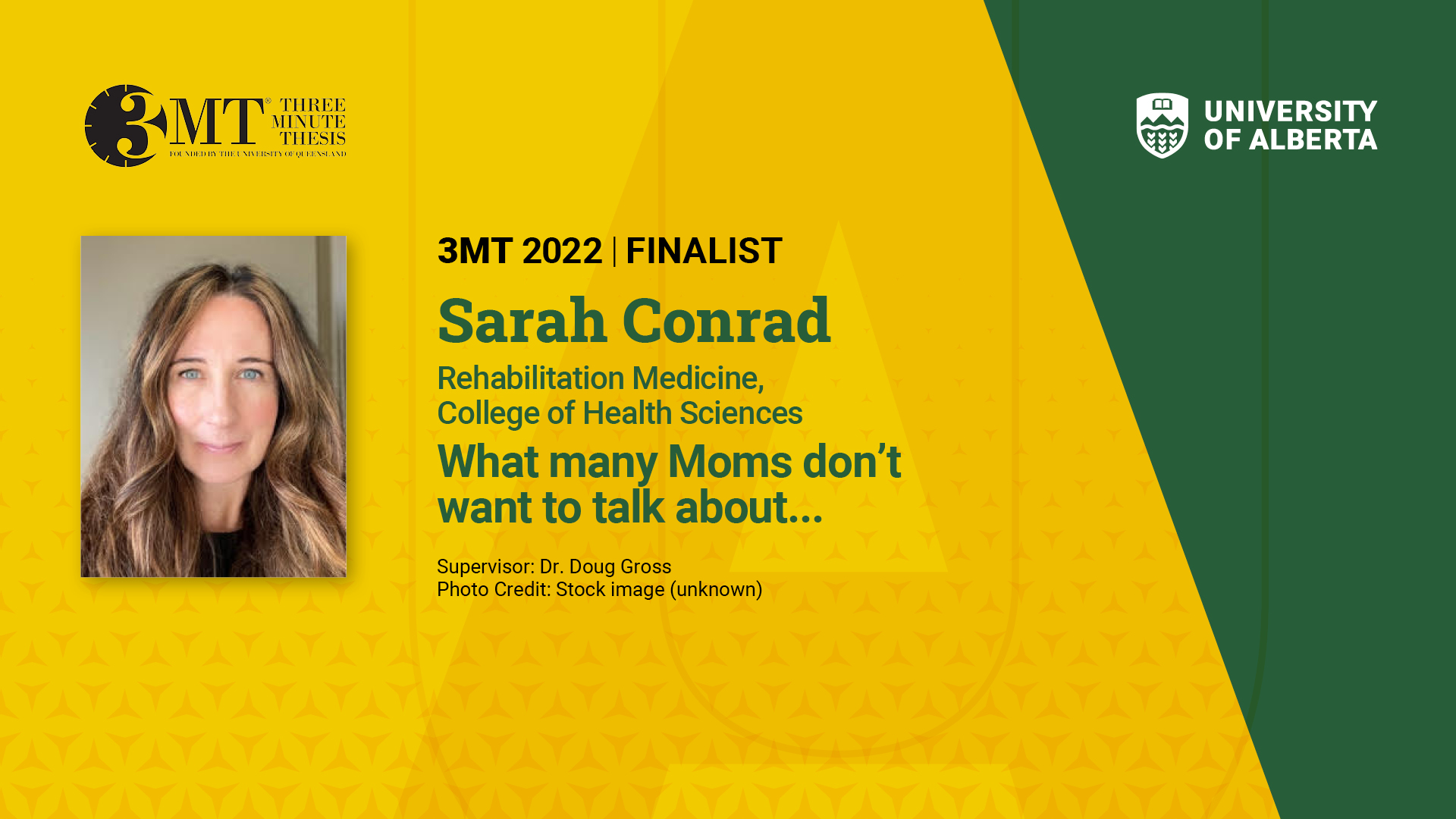This week, we are profiling finalists for the Faculty of Graduate Studies and Research's Three Minute Thesis (3MT) competition. 3MT condenses thousands of words and years of research led by graduate students who are making a difference in the local and global community. Check out all of the finalist profiles and vote for the People’s Choice Awards. Find out if your pick was a winner during the livestreamed Finals on March 29, 2022 at 1 pm MST.
Tell us about your research!
My research is focused on the pelvic floor disorder Pelvic Organ Prolapse. This is a disorder in which the organs protrude beyond the vaginal walls. This awful bulging sensation has a negative impact on the quality of life of these women. Unbelievably, it is estimated that 1 in 3 women will encounter or are currently living with prolapse.
My research is focusing on measurement tools not based on anatomy but instead on patient experience. In particular the measurement tools being used in non-surgical environments. I will present the current evidence on these measurement tools and aid healthcare providers in choosing the most robust measurement tool. This is important because in order for there to be an advancement of patient-care we need to ensure the measurement tool is accurately identifying the concerns of the patient.
How did presenting a Three Minute Thesis (3MT) help explain your research to the public?
This has been a fantastic experience for knowledge translation! My topic is not easy to discuss in public environments as many people have a hard time even just saying the word “vagina.” This can make discussing problems with our delicate anatomy even more difficult. The peer-review session was really helpful in guiding me to find the correct words and helped me move out of my “discipline specific” lenses with my word choices. Ultimately, this helped me to convey my message with improved clarity.
What does innovation mean to you?
The first thing that comes into my mind is “exciting.” Innovation to me means energy, it means I am excited to make change happen.
What’s one big problem you want to solve through your work?
A big part of the problem with pelvic organ prolapse is the way in which severity is measured. Interestingly, the anatomy and the symptoms experienced by these patients are not always the same. For instance, the healthcare provider may use an anatomical measurement tool and classify her prolapse as “mild or moderate,” but the patient’s experience of this awful vaginal bulge when she is walking with her friends is “moderate to severe,” sometimes enough to make her stop walking.
My research is focusing on the strength of the psychometric properties (reliability, validity and responsiveness) of the measurement tools that are not based on anatomy but instead on patient experience. This is integral to ensuring the interpretation of the results (ie., from an intervention) are accurate. In other words, the more robust the psychometric properties the more confident the clinicians/researchers can be about their results. My results will aid clinicians/researchers in their choice of measurement tools to capture correctly the concerns of their patients. Additionally, using these tools will enable a platform for discussion between the provider and the patient, aiding in a patient-centered approach by allowing patients to voice their unique concerns and expectations of the proposed treatment strategy.
Who do you look up to as a mentor or collaborator?
My mentor is Dr. Cathy Flood, a urogynecologist at the Lois Hole Hospital for women. She is an international leader in the field of urogynecology, and I deeply admire her desire to make changes in our healthcare procedures and policies. Her passion to promote pelvic health in marginalized populations not only in Edmonton, but other parts of the world, inspired a women's health initiative project in Peru from 2015-2019. This project inspired me to return to university and expand my knowledge and research skills for pelvic organ prolapse prevention and treatment.
Why is the University of Alberta a great place to learn, research and/or innovate?
There is great energy at the University of Alberta, particularly the Faculty of Rehabilitation Medicine. During these COVID-19 years there has been a huge adaptation to change and learning in the academic environment. I have felt nothing but genuine support from my advisor Dr. Doug Gross. For instance, his collaboration with Dr. Linda McLean at the University of Ottawa was essential for my graduate studies success. Dr. Mclean is a leading researcher in pelvic health, her advice and guidance as an expert in this area has been instrumental in this research project. I am excited to see where the next steps of this academic experience will take me here at the U of A.
Innovator Spotlight is a series that introduces you to students whose big ideas are making a big difference.
Do you know someone who’s breaking boundaries at the U of A? (Maybe it’s you!) We’re interested in hearing from students who are creating new solutions to make our world better, no matter their discipline or year of study.
Get in touch at youblog@ualberta.ca.
